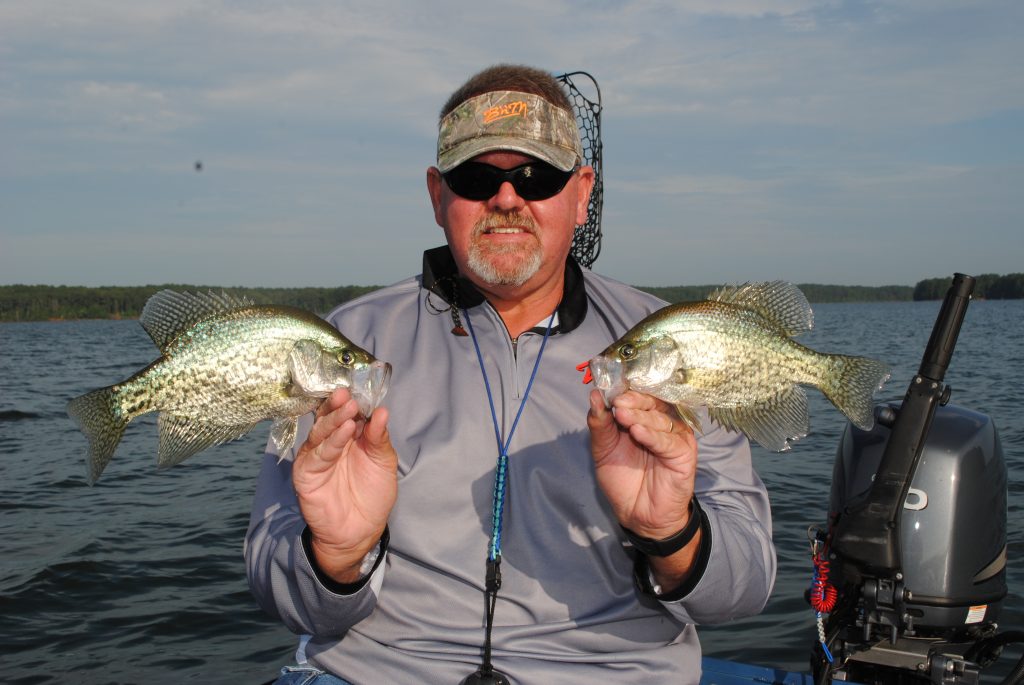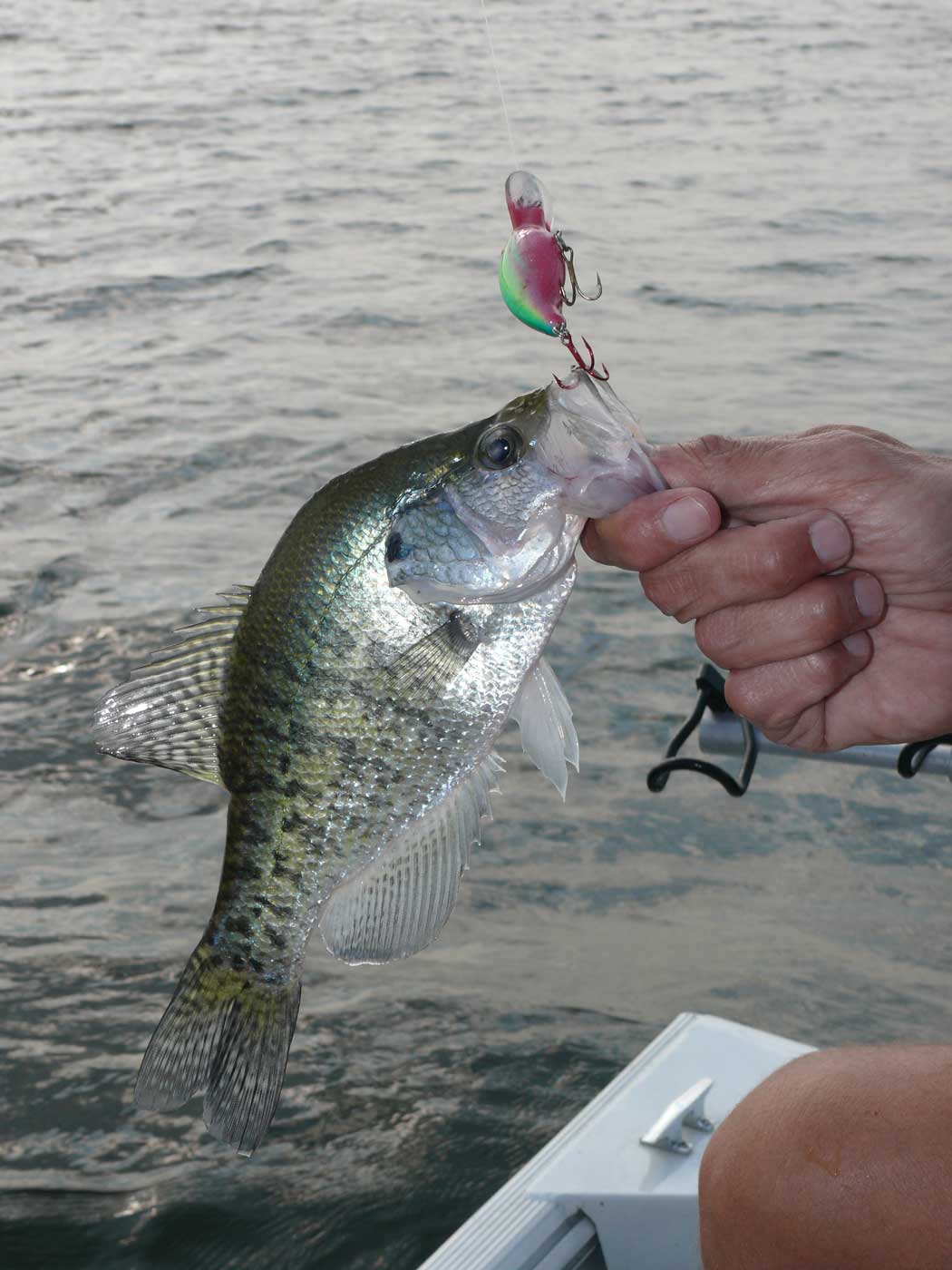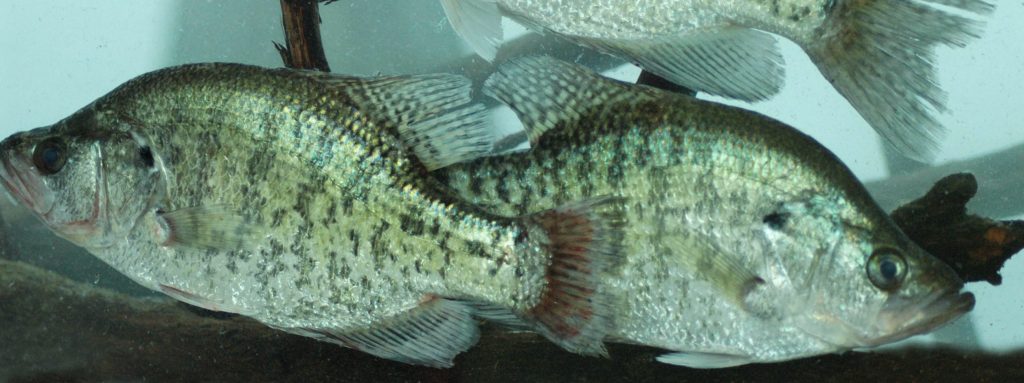While visitors arrive by the thousands each year to sample Lake Guntersville bass fishing, crappie catches are mainly confined to locals, most of whom are quite content to keep their fall crappie fishing secrets to themselves. Crappie are generally not the first consideration when people discuss Lake Guntersville fishing.
The sprawling Tennessee Valley Authority reservoir in northeast Alabama features just about any type of fishing imaginable. Of course, largemouth bass sit atop the Guntersville hierarchy and the Big G remains a top bass lake.
Crappie are one part of the overall fishery that tends to be overlooked, at least outside the area. While visitors arrive by the thousands each year to sample Lake Guntersville bass fishing, crappie catches are mainly confined to locals, most of whom are quite content to keep secret that segment of Guntersville fishing.

More and more, however, the crappie fishing secret is out. Crappie are super abundant on Lake Guntersville, grow up to three pounds and offer yearlong, around-the-clock opportunities. At different times of the year, Guntersville crappie can be caught in just about any way possible.
Trolling remains a definite option, even on a lake dominated by acre after acre of grass. The bridges that cross major tributaries are crappie magnets and attract crowds that occasionally number in the hundreds. Even old-fashioned casting remains a go-to approach on Guntersville. Add other techniques that might be considered a bit extreme by some crappie enthusiasts, and Guntersville ranks with just about any other Alabama lake in terms of its crappie fishing.
Mike Carter, a guide on the lake, generally put his clients on Guntersville bass in the past. However, within the last year, he began to focus on the crappie fishing potential of the lake. “It is overlooked,” Carter said. “People look at Weiss as a great crappie lake, and it is a great crappie lake, but I can usually catch just as many on Guntersville. There may be a few days when I don’t catch as many, but the quality is just so much better. We catch so many big crappie over here in the fall and winter.
“I’ve always advertised fall crappie fishing but never pushed it. Last year, I pushed it, and people found out what it was like. We caught a lot of crappie and a lot of big crappie. We had several days in October and November when we were catching 150 to 200 crappie per day. That kept up through December.”
When Carter talks about big fish, he has the pictures to prove it. His wife Sharon and several clients all caught 3-pound Guntersville crappie last year.
“We regularly caught quality fish of 1.5 pounds up to two pounds,” Carter said, “We caught numerous fish over two pounds and a few that we weighed more than three. The quality is what separates Guntersville from other lakes.”
Old School Crappie Fishing Approach
While Carter makes use of modern technology to locate crappie on Guntersville, his approach to catching them is decidedly old school. “Just about all I do is cast,” he said. “I don’t troll and I don’t use minnows. I cast and find that my clients love it. If I have some kids along, I might bring some minnows to help them out a little bit, but otherwise I just cast a jig for them.”
Carter locates his crappie holding on main-lake stumps from Scottsboro to the Highway 117 bridge near Stevenson. He uses side-imaging technology to locate the fish.
“You find them on any type of deep structure,” Carter said. “I have a lot of stumps that I fish upriver from Scottsboro north. On any deeper stump out in eight, 10, 12, 14 feet of water that makes an eddy on the downriver side, those fish will stack up on the downriver side of the stumps. Once you find them, you can usually sit there and catch fish all day long.”
Carter’s fall crappie fishing secret – keep it basic. He uses medium-action, 6.5-foot spinning rods and a quality reel spooled with 4-pound-test Vicious monofilament. Because he uses light jig heads (1/24- or 1/32-ounce) the light line is essential in getting the bait down to the crappie. It cuts through the current better than a heavier line.

Carter pairs the light jigs with Bobby Garland plastics. Popular colors on the lake include pink pearl, pearl chartreuse, Cajun cricket and electric chicken.
Casting comes into play in a variety of situations on Guntersville. A night bite starts in the fall and continues into the frigid days of winter. Anglers target steep bluff walls, casting their jigs to the bank and letting them pendulum back to the boat.
“You just watch your line in the black light and see that tic,” said Bevan Berry, who makes the trip to Guntersville throughout the year from his home near Tuscumbia. “I haven’t done it that much, usually starting sometime around Thanksgiving. When I start fall crappie fishing at night, and that’s when you can usually catch them.”
Berry uses jigs and plastics similar to those employed by Carter.
“Most people on Guntersville are fishing the bridges or vertical fishing the bluffs with minnow rigs,” Berry said. “Casting light jigs on the bluff walls gives these fish a different look that they don’t see that often.”
Hit the Bridges For Crappie
As Berry suggested, one of the primary approaches to Guntersville fall crappie fishing occurs around the bridges crossing the many tributaries that enter the lake. The bridges, frequently labeled causeways around Guntersville, and the surrounding riprap host a parade of crappie through the fall, winter and early spring months.
Generally, the Thanksgiving holiday marks the start of the best bridge fishing on Guntersville. Even on the coldest days – or nights – a congregation of crappie anglers gathers at the bridges to battle the elements and test their fishing skills against the crappie, which often become finicky because of the intense pressure.

Choice spots include the Highway 69 bridge crossing Browns Creek on the lower end of the lake and the Highway 227 bridges over Short, Town and South Sauty creeks near Guntersville State Park. However, just about any bridge area that features deep water will likely hold crappie at times. Anglers gather on the bank with choice spots almost always taken by daylight when the bite is good. The bank anglers compete with boaters, who tie up to the bridge.
While bank fishing might suggest an unsophisticated approach, many of the bridge fishermen arrive with top-end tackle and don’t hesitate to drop down to fluorocarbon line as light as 2-pound test when 4-pound is not getting the job done.
The best bridge fishermen experiment with jig size, starting at 1/16-ounce, but working down to miniscule models to get the fall rate right on a given day. Guntersville area tackle stores stock jigs as light as 1/64-ounce at times.
Plastic preferences change with the season, but popular crappie fishing secrets remain Bobby Garland, Bass Assassin, Mister Twister and Slider.
Break Out the Guns
Winter is the time for a little shooting on Guntersville. Yes, duck hunting is popular on the lake, but in this case, ‘shooting” means shooting docks for crappie.
Late fall crappie fishing, especially in the colder winter months through the prespawn, crappie gather around the myriad of docks found on Guntersville. If the current is light, main-lake docks are best. If the current is heavy, the fish will typically move back into the tributaries and coves to the first available dock.
The crappie fishing secret of shooting docks is a repetitive, even addictive approach, requiring a whip-like rod to propel light jigs and plastics underneath a dock. Anglers like Carter, who occasionally deviates from his casting routine to shoot docks, seek out older, bigger platforms with bigger posts if available. The bigger posts provide the crappie some relief from the constant pressure of current.
The docks just upstream and downstream from the Waterfront area can be productive for dock shooting, but the lake features plenty from one end to the other.
While shooting docks can be a bit intimidating for inexperienced anglers, a little practice allows even novices to put a jig in front of a crappie under a dock.
Trolling For Crappie Proves Productive
While trolling is perhaps not as popular on Guntersville as on other lakes, the many variations still catch plenty of fish.
Scott Echols, who lives in Eva in Morgan County, once viewed Wheeler as his home lake, but has recently found that Guntersville is consistently better. Echols employs different trolling techniques throughout the year on Guntersville, but begins a combination of long-lining and pushing in late winter. He uses rod holders to organize his trolling spread.
“I usually start long-lining in February, maybe in late January, depending on the weather,” Echols said. “I catch them that way all the way into the spring. I catch my biggest fish in the late winter.”
Using four rods out the back and four to six out the front, Echols lets out line until he finds the right combination of line length and jig size that gets the lure to the depth preferred by crappie. He also switches jig sizes, but normally uses a 1/16-ounce model, either a Road Runner or a plain jig. As the fish move shallower around the spawn, Echols switches to a 1/32-ounce jig and trolls at about 1.1 or 1.2 miles per hour.

At times, Echols will add two rods positioned out of the very front of the boat and “pushes” the same jigs. He threads a large egg sinker, occasionally two, onto the main line. He also adds a swivel and attaches a 2-foot leader tipped by a Road Runner and live minnow combination. Echols uses Crazy Angler Slab Bandits and other plastics by Southern Pro and Slider. He said color choice can change from hour to hour, so don’t hesitate to experiment.
Guntersville crappie can require some time to locate, but once he finds them, Echols said they are generally easy to catch. He spends most of his time on the lower end of the lake, specifically mentioning the black crappie bite in Honeycomb Creek as one of his favorites.
Beating the Heat
Crappie fishermen typically take a hiatus through the late spring and summer months. A crappie fishing secret, however, is the crappie are still feeding and Berry and others target them with crankbaits trolled over feeding flats and along contour lines in the creeks.
“White crappie group up on the flats and are really overlooked,” Echols said. “There’s really not that many people fishing for them.”
Fishing from a War Eagle 754 aluminum boat, Echols uses a spread of up to 12 B”n”M rods in models of various lengths to keep his spread of Bandit crankbaits separated. He favors 200 series Bandit crankbaits, typically in black or black and chartreuse. He reserves a couple of the rods up front for vertical fishing jigs.

“I think it’s a reaction bite,” Berry said. “If you let out 90 to 110 feet of line and pull at 1.6 or 1.7 mph, the fish will bite if you get it around them. The book says 1.4 to 1.8 mph, but I think 1.6 mph is about right.”
Berry favors Browns Creek. He likes both the feeding flats from the bridge to the power lines to the south and the secondary channels on the main-river side of the bridge. He also fishes Spring Creek and Town Creek. Echols also turns to pulling crankbaits in the late spring and summer months when the other patterns fizzle out.
“Too many people give up on the fish,” he said. “They are still eating and can be caught. You may not always catch as many fish later in the year, but you can still catch plenty pulling crankbaits.”
Crappie Reputation Grows
Carter acknowledged that crappie will likely never supplant bass as the fish of choice on Guntersville. That doesn’t mean the crappie fishing isn’t exceptional. In the last few years, it may have been consistently better than the bass fishing.
“When anglers think of Guntersville, they think of bass,” Carter said. “They don’t necessarily think about crappie. I think last year opened up a lot of eyes about just how good the crappie fishing can be. I don’t see it changing. Guntersville’s reputation as a crappie lake will only grow”
So with the Lake Guntersville crappie reputation growing, now is the perfect time to get out there and deploy these fall crappie fishing secrets, straight from the locals, before the word is out.




